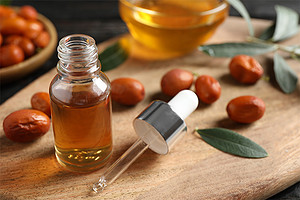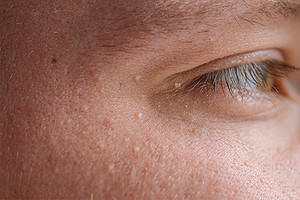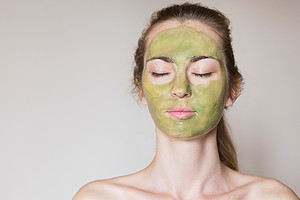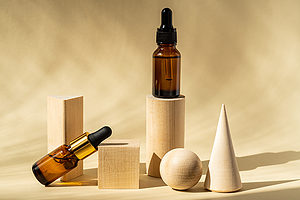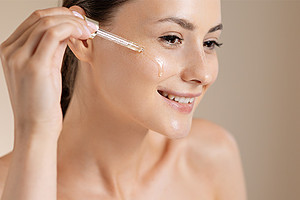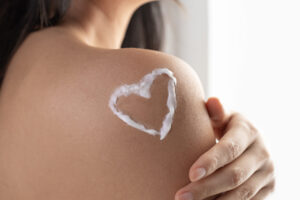Yes, retinols are safe and effective for oily skin. Retinols are the subtype of retinoids that decrease the size and secretion of sebaceous glands, treat acne, (1) and shrink pore size (2) – larger pore size results in more sebum production. (1)
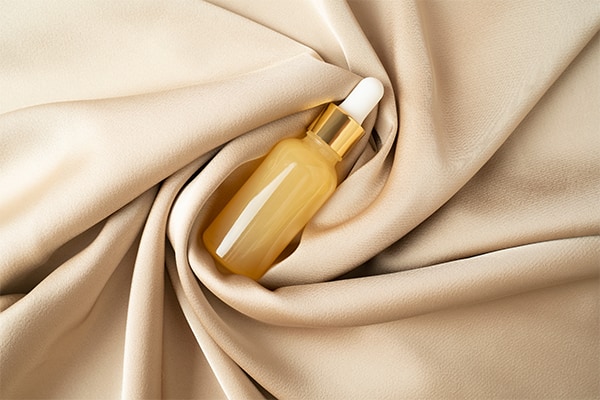
Moreover, retinol synthesizes collagen and improves acne scars. (3) Retinol is a game changer in the skin care industry and can do wonders for your skin. Retinol, a vitamin A derivative, (4) has gained popularity over the past few years, especially as an ingredient in oily skin care products.
Thus, retinol serum is suitable for oily skin. Continue reading to learn more about retinol serum for oily skin.
Article Contents
What Is Retinol and How Does It Work?
Retinol is also known as vitamin A, and vitamin A and various compounds obtained from it are known as retinoids. (4)
Vitamin A refers to fat-soluble compounds found as retinol (vitamin A) in animals and pro-vitamin A carotenoids in vegetables and fruits.
Retinoic acid, retinal, and retinol are three active forms of vitamin A present in the body.
The human body can convert retinol into retinal, which can be oxidized to retinoic acid. Retinoic acid is the form of vitamin A that regulates gene transcription.
Retinoic acid, retinal, and retinol are referred to as retinoids. (5)
Retinol penetrates the skin’s outer layer and slightly penetrates the skin’s inner layer. It reduces transepidermal water loss, strengthens the epidermal protective function, and prevents collagen degradation (which degrades the extracellular matrix that attaches to and communicates with cells nearby and is essential for cell growth, movement, and other functions). (6)
What Is Oily Skin?
When the pores on your skin overproduce sebum, oily skin results. (7) According to dermatologists, the following reasons make the skin oily: (8)
- Environment
- Stress levels
- Hormones
Increased oil production is directly proportional to acne. (7) When your skin pores trap excess sebum, breakouts occur. Sebum also mixes with dead skin cells and bacteria, resulting in pimples. (9)
The good news is oily skin has fewer wrinkles. (10) The vitamin E in sebum helps fight environmental damage caused by free radicals. (4)
Can Retinol Serum Benefit Oily Skin?
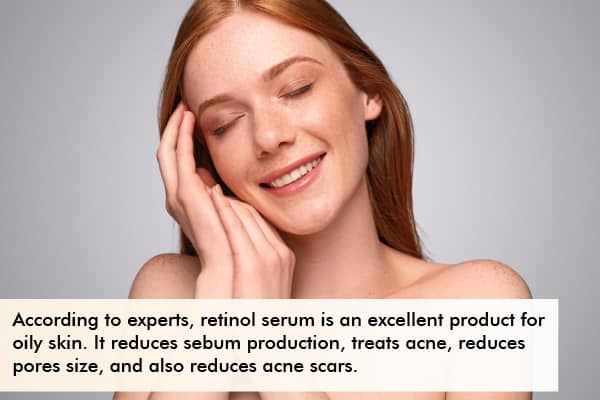
According to experts, retinol serum is an excellent product for oily skin.
1. It reduces sebum production.
Retinols are a subtype of retinoids. Retinoids significantly reduce differentiation, sebocyte proliferation, and sebum synthesis.
When applied topically, retinoids bind to the retinoid receptors of the sebocytes, decreasing sebum production. Isotretinoin (13-cis retinoic acid) is an oral retinoid proven to reduce sebum production by decreasing the size of the sebaceous glands.
Oral isotretinoin decreases sebum production by 90%. (1) Retinoids reduce sebocyte differentiation and cellular division by decreasing lipogenesis enzyme activity. (6)
2. It treats acne.
The use of topical retinoids began in the early 1970s to treat multiple skin conditions, especially acne vulgaris. (1)
According to the American Academy of Dermatology (AAD), retinoids are comedolytic and are the core of topical therapy. They are anti-inflammatory, resolve precursor microcomedone lesions, and allow for clearance maintenance. (11)
Topical tretinoin (at-RA, all-trans-retinoic acid) is a mild-to-moderate effective and safe acne treatment. Oral isotretinoin (13-cis-retinoic acid) treats severe acne cases resistant to topical therapies.
Topical retinoids (tazarotene 0.1%; adapalene 0.1% and 0.3%; tretinoin 0.01%, 0.025%, 0.038%, 0.04%, 0.05%, 0.08%, and 0.1% in the USA; isotretinoin 0.05% and 0.1% in other regions of the world) have a crucial function in curing acne, reducing visible lesions, and inhibiting the development of acne and new lesions. (11) They block many crucial inflammatory pathways activated in acne. (11)
The concentration of commonly used tretinoin to remove acne varies from 0.01% to 0.4%. (6)
Retinoids accelerate corneocytes’ shedding, normalizing acne’s outer layer to shed. It causes the expulsion of mature comedones (small, skin-colored bumps, papules) and suppresses the formation of microcomedones (minor acne blemishes). (12)
3. It reduces pores size.
According to experts, topical retinoids reduce the size of facial pores. (2) Large pores produce more sebum.
Tretinoin and tazarotene (belonging to a class of retinoid medicines) reduce the size of facial pores. In a study, 42% of the subjects ministered with tazarotene daily, once a day, for 24 weeks noticed reduced pore size. (1)
Another study including 60 women who were treated with 0.025% tretinoin once a day for 90 days observed reduced pore size in the subjects after 28 days. These results lasted for the rest of the treatment duration. Additionally, it was noticed that patients were delighted with this treatment. (13)
However, some patients also experienced a burning sensation and erythema and didn’t proceed with the treatment. (13)
This study compared 0.025% tretinoin with retinol and discovered that the satisfaction levels of the tretinoin group were equal or more with those of the retinol group, with fewer side effects.
This means you do not need prescription-strength retinoids to reap their benefits. (13)
4. It reduces acne scars.
When skin loses collagen, acne scars become more visible. (14) Retinol aids in the synthesis of collagen fibers by boosting fibroblasts and increasing their activity. (6)
Vitamin A (retinol) and its derivatives (tretinoin and retinaldehyde) have antioxidant properties that stimulate collagen production by acting directly on collagen metabolism. It further prevents acne scars and restores skin’s elasticity. (3)
Tretinoin (a part of retinoid) (15) reduces and curbs acne scars by preventing the pores from clogging. (16)
Note: When the serum retinol concentration is lower than 0.70 μmol/L (20 μg/dL), vitamin A deficiency ensues. (5)
How to Apply a Retinol Serum?
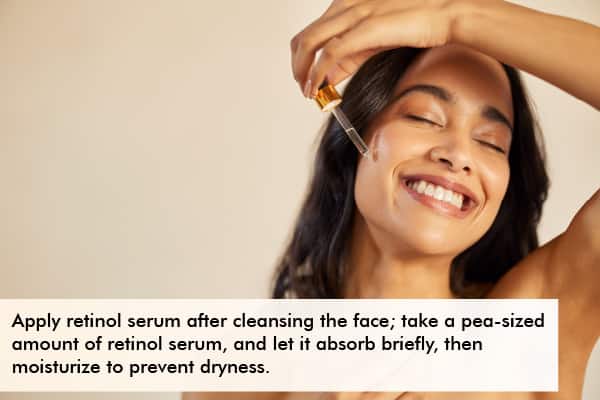
Follow these steps to apply a retinol serum:
- Wash your face with a mild cleanser. Pat it dry. (Make sure your skin is thoroughly dried.)
- Take a pea-sized amount of retinol serum and apply it to your face.
- Let it get absorbed for a few seconds.
- Follow it up with a moisturizer to prevent dryness.
General Queries
Is it safe to use retinol-based products during pregnancy?
No, according to the researchers, topical use of retinoids must be strictly avoided during pregnancy. (17)
Can adolescents use retinol serum for oily, acne-prone skin?
Adolescents can use retinols. Younger users may use retinol less frequently or in minimal concentration.
Retinol reduces sebum production and breakouts and enhances skin texture in acne-prone skin. It increases skin cell turnover (bringing new cells to the skin’s surface and eliminating old, dead cells) and reduces pigmentation and uneven skin tone in all users.
What to expect from regular use of retinol serum?
Using retinol regularly will visibly reduce skin aging signs such as dark spots, wrinkles, dullness, acne, oily skin, loss of plumpness and elasticity, etc.
Final Word
Retinol is a popular skin care ingredient. What most are unaware of is that a retinol serum can help treat oily skin. Retinol speeds up cell turnover and is beneficial for oily skin.
First-time retinol users must be aware of its side effects. Always consult your dermatologist before trying any new product.
References
- Endly DC, Miller RA. Oily skin: A review of treatment options. The Journal of clinical and aesthetic dermatology. August 2017. https://www.ncbi.nlm.nih.gov/pmc/articles/PMC5605215/.
- Mukherjee S, Date A, Patravale V, Korting HC, Roeder A, Weindl G. Retinoids in the treatment of Skin aging: An overview of clinical efficacy and safety. Clinical interventions in aging. 2006. https://www.ncbi.nlm.nih.gov/pmc/articles/PMC2699641/.
- Ganceviciene R, Liakou AI, Theodoridis A, Makrantonaki E, Zouboulis CC. Skin anti-aging strategies. Dermato-endocrinology. July 1, 2012. https://www.ncbi.nlm.nih.gov/pmc/articles/PMC3583892/.
- Vitamin A and skin health. Linus Pauling Institute. January 3, 2023. https://lpi.oregonstate.edu/mic/health-disease/skin-health/vitamin-A#acne.
- Vitamin A. Linus Pauling Institute. January 3, 2023. https://lpi.oregonstate.edu/mic/vitamins/vitamin-A#introduction.
- Zasada M, Budzisz E. Retinoids: Active molecules influencing skin structure formation in cosmetic and dermatological treatments. Postepy dermatologii i alergologii. August 2019. https://www.ncbi.nlm.nih.gov/pmc/articles/PMC6791161/.
- Rho N-K, Gil Y-C. Botulinum neurotoxin type A in the treatment of facial seborrhea and acne: Evidence and a proposed mechanism. Toxins. November 19, 2021. https://www.ncbi.nlm.nih.gov/pmc/articles/PMC8626011/.
- How to control oily skin. American Academy of Dermatology. https://www.aad.org/public/everyday-care/skin-care-basics/dry/oily-skin.
- Acne: Overview – informedhealth.org – NCBI bookshelf. https://www.ncbi.nlm.nih.gov/books/NBK279211/.
- Wang Y-na, Fang H, Zhu W-fang. Survey on skin aging status and related influential factors in southeast China. Journal of Zhejiang University. Science. B. January 2009. https://www.ncbi.nlm.nih.gov/pmc/articles/PMC2613964/.
- Leyden J, Stein-Gold L, Weiss J. Why topical retinoids are mainstay of therapy for acne. Dermatology and therapy. September 2017. https://www.ncbi.nlm.nih.gov/pmc/articles/PMC5574737/.
- Motamedi M, Chehade A, Sanghera R, Grewal P. A clinician’s guide to topical retinoids. Journal of cutaneous medicine and surgery. 2022. https://www.ncbi.nlm.nih.gov/pmc/articles/PMC8750127/.
- MC; BAVALI. A double-blind randomized study comparing the Association of Retinol and LR2412 with tretinoin 0.025% in photoaged skin. Journal of cosmetic dermatology. https://pubmed.ncbi.nlm.nih.gov/25603890/.
- Acne scars: Overview. American Academy of Dermatology. https://www.aad.org/public/diseases/acne/derm-treat/scars.
- Callender VD, Baldwin H, Cook-Bolden FE, Alexis AF, Stein Gold L, Guenin E. Effects of topical retinoids on acne and post-inflammatory hyperpigmentation in patients with skin of color: A clinical review and implications for Practice. American journal of clinical dermatology. January 2022. https://www.ncbi.nlm.nih.gov/pmc/articles/PMC8776661/.
- Retinoid or retinol? American Academy of Dermatology. https://www.aad.org/public/everyday-care/skin-care-secrets/anti-aging/retinoid-retinol.
- Putra IB, Jusuf NK, Dewi NK. Skin changes and safety profile of topical products during pregnancy. The Journal of clinical and aesthetic dermatology. February 2022. https://www.ncbi.nlm.nih.gov/pmc/articles/PMC8884185/.


